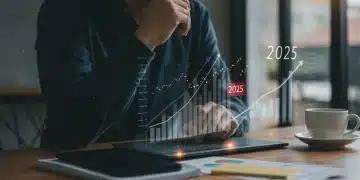Strategies to reduce credit card debt effectively

Strategies to reduce credit card debt include creating a detailed budget, prioritizing debt payments, seeking professional help when necessary, and regularly adjusting financial plans to stay on track towards becoming debt-free.
Strategies to reduce credit card debt are essential for regaining financial stability. With rising interest rates and mounting pressure, it’s crucial to explore effective ways to manage what you owe. Have you ever felt overwhelmed by payments? Let’s dive into some approachable methods to ease that burden.
Understanding credit card debt
Understanding credit card debt is crucial for effectively managing your finances. Many people find themselves overwhelmed by the amount they owe on their credit cards. It’s vital to first recognize how credit card debt accumulates. This can help you develop strategies for reducing your debt and improving your financial situation.
What Causes Credit Card Debt?
Multiple factors contribute to the growing issue of credit card debt. One major cause is overspending. When people use credit cards, they may not realize how quickly their balances can add up. Unexpected expenses, such as medical bills or car repairs, can also lead to debt accumulation.
- Impulsive purchases
- Lack of budgeting
- High-interest rates
- Unplanned emergencies
Another key contributing factor is the interest rates associated with credit cards. These rates can be significantly high, causing your small purchases to become large debts over time. Understanding how interest works is vital; if you only pay the minimum each month, your total owed can grow rapidly.
How to Assess Your Credit Card Debt
Start by listing all your credit cards along with their balances and interest rates. This can give you a clear view of your current situation. Assessing debt helps you prioritize which cards to pay off first. Generally, it’s wise to focus on the card with the highest interest rate or the smallest balance to build momentum.
Tracking your spending habits can also aid in understanding where your money is going. By recognizing unnecessary expenditures, you can redirect funds towards debt repayment. Consider using apps or spreadsheets to monitor your financial activity effectively.
Practical strategies to cut down your debt

Practical strategies to cut down your debt can make a significant difference in achieving financial freedom. Implementing effective methods can help you tackle your credit card bills and expenses with confidence. It’s essential to prioritize your efforts to manage your finances.
Establish a Budget
Creating a detailed budget is one of the most effective ways to manage and reduce debt. A budget allows you to see where your money goes each month. By tracking your income and expenditures, you can identify areas to cut back on spending.
- List all sources of income
- Track monthly expenses
- Identify discretionary spending
- Set clear financial goals
Once you have a clear picture, you can adjust your spending habits. For instance, reducing dining out or subscription services can redirect those funds toward paying off existing debts faster.
Pay More than the Minimum
Another practical tip is to pay more than the minimum payment on your credit cards. This small adjustment can significantly reduce the amount of interest you pay over time. Focus on paying off the card with the highest interest rate first—this is known as the avalanche method.
By committing to paying more, you can significantly reduce your overall debt quicker. Even an extra $20 a month can contribute to paying off your balance faster and saving you money on interest. This proactive approach encourages you to be mindful of your spending habits.
Consider Balance Transfers
If you’re struggling with high-interest rates, consider balance transfers as a strategy. Many credit card companies offer promotional low or zero interest rates on transferred balances for a limited time. This can provide some relief as you work to pay down your debt.
- Research potential balance transfer offers
- Calculate potential savings
- Be aware of transfer fees
- Create a plan to pay off the transferred balance
By utilizing these strategies, you can make a more significant impact on your credit card debt and develop better financial habits.
The role of budgeting in managing debt
The role of budgeting in managing debt is essential for anyone looking to regain financial control. A budget serves as a roadmap, guiding you towards your financial goals while helping you understand your spending habits. By setting a clear budget, you can make informed decisions that ultimately reduce your debt.
Creating a Solid Budget
To effectively manage your debt, start by creating a solid budget. This includes identifying your total income and listing all expenses. Understanding where your money goes each month is crucial in identifying areas for improvement. Establish categories for necessary expenses like housing, food, and transportation, as well as discretionary spending.
- Track monthly income from all sources
- List fixed and variable monthly expenses
- Review past bank statements to get accurate figures
- Adjust categories as needed
Regularly revisiting your budget helps you stay on track. If unexpected expenses arise, it’s important to adjust your budget accordingly to avoid falling behind.
Prioritizing Debt Payments
Another important aspect of budgeting is prioritizing your debt payments. Once you have a clear picture of your financial situation, allocate funds specifically for paying down your debts. This means committing a portion of your income each month to tackle debts systematically. Focus on the debts with the highest interest rates first, as this strategy can save you money in the long run.
Consider using methods like the snowball technique, where you pay off the smallest debts first to build momentum. This can motivate you to continue managing your finances. Conversely, the avalanche method focuses on the highest interest rate debts. Choose the method that fits your personality and financial situation better.
Adjusting Your Budget Over Time
As life changes, so should your budget. It’s important to assess your financial goals regularly and make necessary adjustments. If you receive a raise or have increased expenses, reflect these changes in your budget. Continuous monitoring allows you to stay informed about your financial health and makes it easier to spot trends in your spending.
Remember, the key to successful budgeting is consistency. Set aside time each week or month to review your spending and adjust your budget. This proactive approach ensures you are actively managing your debt and working towards financial freedom.
When to seek professional help

Knowing when to seek professional help is crucial for effectively managing your debt. Many people struggle with credit card debt, and there comes a time when self-management may no longer be enough. Understanding the signs can help you determine the right moment to consult a financial expert.
Signs You Need Professional Assistance
If you’re overwhelmed by your credit card payments and feel like you are drowning in debt, it’s a sign that professional help may be needed. Another indicator is if you’re only making the minimum payments. This can lead to increased interest and a prolonged debt timeline.
- Feeling stressed or anxious about money
- Missing payments or defaulting on loans
- High use of credit cards for everyday expenses
- Receiving collection calls from creditors
If you notice these patterns, it’s wise to reach out for support before the situation worsens. Financial advisors or credit counseling services can offer valuable resources and strategies tailored to your specific needs.
Types of Professional Help
There are various types of professional help available. A certified financial planner can provide you with a comprehensive financial analysis and guide you in developing a budgeting plan to manage debt effectively. Credit counselors specialize in helping individuals with debt repayment strategies and can negotiate with creditors on your behalf.
Additionally, consider debt management programs. These programs work with creditors to reduce interest rates, consolidate debts, and create manageable monthly payments. It’s important to thoroughly research any organization before committing to their services.
What to Expect from Professional Help
When you seek professional assistance, you can expect a thorough evaluation of your financial situation. Professionals will typically review your income, debts, and expenses to create tailored solutions for your needs. Open communication is important, as it allows you to address your concerns and understand the recommended strategies.
Moreover, learning from professionals about budgeting, saving, and debt management can equip you with the skills needed for long-term financial health. They can provide resources and support that may alleviate stress as you work towards becoming debt-free.
FAQ – Frequently Asked Questions about Managing Credit Card Debt
What is the first step to take when dealing with credit card debt?
The first step is to create a budget that outlines your income and expenses, allowing you to see where you can cut back and allocate more funds to debt repayment.
When should I seek professional help for my debt issues?
You should seek professional help if you are feeling overwhelmed, only making minimum payments, or receiving collection calls from creditors.
How can I prioritize which debt to pay off first?
Focus on paying off debts with the highest interest rates first, or consider using the snowball method, where you pay off the smallest debts first to build momentum.
Are there any tools to help me manage my budget effectively?
Yes, there are many budgeting tools and apps available, such as Mint, YNAB (You Need A Budget), and personal finance spreadsheets that can help you manage your finances.





